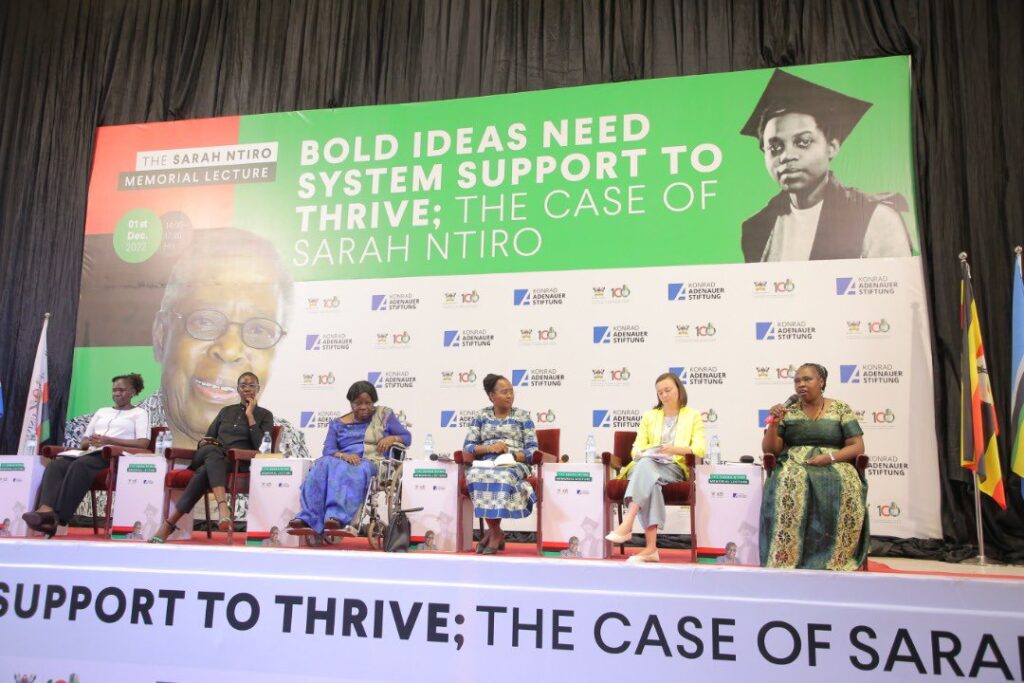Makerere University has held a memorial lecturer for its alumnus, and East and Central Africa’s first female graduate, Sarah Nyendwoha Ntiro.
Hailing from Bunyoro, Sarah Ntiro changed the status quo at Makerere University in 1945 when then Makerere University College opened its doors, and admitted the first female students.
The University had started with only male students in 1922 with the motto, “Let us be men.”
However, following the admission of female students, the motto was changed to “we build for the future.”
Sarah Ntiro, the first woman to get a degree in the whole of East and Central Africa was one of the female students admitted to Makerere University College.
This ground breaking change ushered in a new era of advancement for Uganda’s female students.
Speaking at the Sarah Ntiro Memorial Lecturer at the University on Thursday, the Vice Chancellor, Prof Barnabas Nawangwe said it is because of the resilience of women like Sarah Ntiro that Makerere has 52% of its student population, female.
“I must add that had it not been for the resilience of people like Sarah Ntiro who was the first female graduate in the whole of East and Central Africa, probably we would not be talking about Makerere having 52% of our students, female,” Nawangwe said.
Sarah Nitro’s memorial lecturer was the 9th of Makerere At 100 lecturer series organized by the University as part of its celebrations to mark 100 years of excellence in building a transformed society.
The Makerere At 100 Lecture Series has been a window through which the University has appreciated the sacrifices made by various men and women, and how their respective contributions shaped the legacy of Makerere as it is known today.
“Today, we will attempt to do just that again, as we examine Sarah Nitro’s life and legacy,” said the University Council Chairperson, Lorna Magara.
Mrs Magara applauded Sarah Nitro’s enormous contribution towards women empowerment, saying that her (Sarah Nitro’s) appreciation for the sanctity of family and the marriage institution may be best expressed by the Private Member’s Bill on the registration of marriages that she tabled before the Legislative Council in 1961.
“Since its enactment, the impact of this legislation on protecting the rights, property and mental health of the bereaved women and children cannot be quantified,” she said.
Uganda’s reflection of Sarah Nitro’s impact takes the country beyond the borders of Uganda to the shores of the United Kingdom where her arrival in the Oxford in 1951 had a legacy of inspiring the less privileged in the United Kingdom and Europe.
Sarah Nitro’s successful testimony in 1954 as the first East and Central Africa female graduate from Oxford, prompted a drastic culture change.
“Fathers who previously did not educate their daughters began doing so. The incredibly impactful life of Sarah Nitro and the many others that have been the focus of our Mak At 100 reflective journey, challenges us to today to revisit our education policies and systems as we relay the foundations for future generations. We hope that through these engagements and many other networks, we will establish platforms through which various stakeholders such as our esteemed audience today can interrogate the current education systems and policies and propose the formulation of new ones,” said Mrs Magara.
The keynote address was delivered by Owekitibwa Joyce Mpanga, a former member of the Buganda Lukiiko, and Sarah Ntiro’s contemporary.
The fact that you [Joyce Mpanga] stood shoulder to shoulder with Sarah Ntiro in a male dominated exploitive Council from 1958 to 61, served with distinction and that here today to present today’s lecture feels me and I believe many others in this audience with great joy and appreciation,” Mrs Magara said.
In her keynote speech, Mrs Mpanga said that wherever Sarah Ntiro is, she is happy with the implementation of Makerere University’s affirmative action (1.5 points scheme) in favour of female students applying to join the institution.
This is done in a bid to increase the number of female students admitted to the University.
“Secondly, in 2019, Makerere’s approval of affirmative policy providing for 40% enrollment quota for female students in Science, Technology, Engineering and Mathematics (STEM),” said Mrs Mpanga.
She added: “the other thing she (Sarah Nitro) would love, is the 2019 amendment of policy and regulations against sexual harassment, and the 2021 move by the Makerere University Council to double the number of awards under the female scholarship initiative from 20 to 40.

